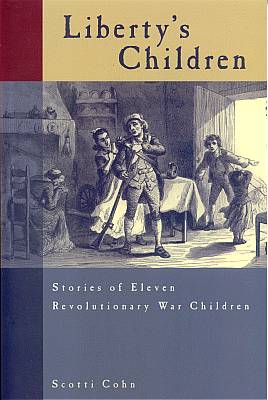|
Liberty's Children
Stories of Eleven
Revolution War Children
by Scotti Cohn
Pub. Date: 08/01/2004
6 x 9, 144 pages, b&w photos
ISBN: 0-7627-2734-9
Imprint: Falcon
|
Sometimes a war's
greatest heroes are its survivors, those who manage to forge new lives
despite the tragedy they have experienced. History books usually do not
describe how a nine-year-old Massachusetts boy might have felt when his
friend was killed in the Boston Massacre or what went through the mind
of a teenage Quaker girl when her family fled Philadelphia.
Children like these found themselves on the edge of the fray-both in
combat and in the throes of daily life-helping, or simply enduring, as
best their interrupted youths allowed. Their behind-the-scenes stories
illustrate what it was really like for children during the Revolutionary
War.
Meet Frances Slocum, a five-year-old girl captured and raised by Native
Americans; James Fortune, a free African American who at the age of
fifteen enlisted on a government-commissioned ship; and Deborah Samson,
who, at twenty, dressed in men's clothes and joined the Continental
army. Learn the inspiring stories of American children who displayed
courage, devotion, and wisdom during the colonies' fight for freedom.
|
Review by
Mary Snodgrass, Kliatt, January 2005
Cohn's collection of 11 biographies is a clever classroom resource. The brief entries cover seven males and four females who lived in New England, Pennsylvania and the Carolinas during the Revolutionary War. Among the issues introduced in the text are colonialists' interactions with Native Americans and the importance of Quaker activism to American history. Of particular value is the introduction to Deborah Samson, one of the first women in the North American colonies known to have served in the military. Students can learn the value of all citizens, old and young, in a desperate struggle for national freedom.
Cohn's writing is readily accessible to average readers from fifth to eighth grade and for literacy classes, ESL, and remedial classes from ninth grade to adult. There is a blend of simple explanations of the times and places with human-interest themes of courage, commitment, and loyalty to a cause. The index is a wealth of names, places, ships, events, and such abstract concepts as food riots, tar and feathers, and the creation of Yankee Doodle. The book is a valuable source for read-aloud classroom stories as well as for student research or general interest.
Mary Snodgrass, Hickory, NC
J--Recommended for junior high school students. The contents are of particular interest to young adolescents and their teachers.
S--Recommended for senior high school students.
COPYRIGHT 2005 Kliatt
COPYRIGHT 2005 Gale Group
Excerpt
from Liberty's Children by Scotti Cohn
"Not Born to be Drowned"
Ebenezer Fox
1763-1843
To Ebenezer Fox of Roxbury, Massachusetts, one thing was clear: The time had come to right a great wrong. For too long the tyrants had abused their power and imposed their
will. Liberty was all that mattered and the sooner the better -- no matter what the cost!
Ebenezer was not alone in his convictions that spring of 1775. Patrick Henry, a member of the House of Burgesses in Virginia, stated the position eloquently. "Is life so dear, or peace so sweet, as to be purchased at the price of chains and slavery?" he asked. "Forbid it, Almighty God! I know not what course others may take, but as for me, give me liberty or give me death!"
Although Ebenezer Fox and Patrick Henry were both zealous in their beliefs, there were several differences between the two. Henry was nearly forty years old, and Ebenezer Fox was twelve. Henry was referring to America's rebellion against injustices committed by Great Britain. Ebenezer Fox had his own personal wrongs to right.
Ebenezer's
father, Richard Fox, was a tailor and very poor. Richard Fox and his wife,
Elizabeth, had a large family. Under such circumstances, children were
expected to contribute to their own maintenance early in life. At age
seven, Ebenezer had been placed under the care of a neighboring farmer
named Pelham.
Ebenezer
enjoyed very little about Pelham's farm. "I imagined," he wrote,
"that I suffered many privations and endured much hardship. Boys are
apt to complain of their lot, especially when deprived of the indulgences
of home."
By the time
Ebenezer was twelve years old, he and his friends (boys in situations
similar to his own) had concluded that they were oppressed. "I
thought that I was doing myself great injustice by remaining in bondage
when I ought to go free," he wrote. "And that the time was come,
when I should liberate myself from the thralldom of others, and set up a
government of my own; or, in other words, do what was right in the sight
of my own eyes."
excerpted
from:
Liberty's
Children: Stories of Eleven Revolutionary War Children
by Scotti Cohn
TwoDot - An Imprint of the Globe Pequot Press
Copyright 2004, all rights reserved
ISBN 0-7627-2734-9
Home
The
Globe Pequot Press
|
